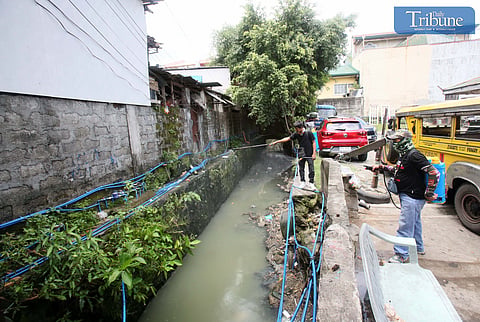
- NEWS
- the EDIT
- COMMENTARY
- BUSINESS
- LIFE
- SHOW
- ACTION
- GLOBAL GOALS
- SNAPS
- DYARYO TIRADA
- MORE

While the Philippines remains without a vaccine against dengue, experts batted on Monday, 16 June, for vector control to eliminate the mosquito-borne illness.
Dr. Fatima Gimenez, past president of the Pediatric Infectious Disease Society of the Philippines, stressed that it's not just the vaccine that is involved in the control of dengue.
"I think our surveillance system should also be ramped up and improved," Gimenez said during the Asia Dengue Voice and Action (ADVA) press conference in Ortigas, Quezon City.
"And since our health system has very much evolved, we know that priorities would be dependent on the local government units (LGU). There has to be collaboration between the central and LGUs," she added, noting that private organizations like the medical societies have always been at the forefront of championing the importance of controlling dengue.
Vector control is something that the government needs to look forward to, according to the health expert.
Common strategies of vector control include eliminating mosquito breeding sites, using insecticides, and employing biological control agents, such as fish that eat mosquito larvae or introducing sterile male insects to reduce breeding rates.
'Dengvaxia closure'
For Dr. Lulu Bravo, international advisor of Asia Dengue Voice and Action Group, there has to be closure on the Dengvaxia issue, which affected how the public views vaccines in general.
Bravo noted that there has been a dramatic drop in vaccine confidence from 93 percent in 2015 to 32 percent in 2018 after the Dengvaxia fiasco.
In 2015, the Philippines became the first Asian country to approve the sale of the world's first-ever dengue vaccine, Dengvaxia.
However, in 2017, controversy arose when Sanofi Pasteur, the vaccine’s manufacturer, announced that Dengvaxia could lead to severe symptoms in individuals who had never been infected with dengue before vaccination.
As a result, the country's Food and Drug Administration ordered the suspension of Dengvaxia’s sale, distribution, and marketing and required its withdrawal from the market.
"I think, for one, there needs to be closure. Because that's one of the hindrances," Bravo said as the country remains without a dengue vaccine.
Currently, vaccine advocates continue to push for the approval of the dengue vaccine, the Japan-manufactured QDenga, highlighting its efficacy and safety, particularly in reducing deaths and severe dengue cases.
QDenga is a vaccine designed to meet the World Health Organization's guidelines for second-generation dengue vaccines. It posts an 80.2 percent effectiveness rate and can be administered to adults, adolescents, and children as young as four years old.
According to the European Medicines Agency, it has also been shown to reduce hospitalization due to dengue by 90 percent.
QDENGA has already applied for a certificate of product registration from the country's Food and Drug Administration (FDA) in 2023.
Health Secretary Ted Herbosa said in 2024 that QDENGA "may be approved anytime," yet the FDA has not yet granted certification.
In March, the Department of Health called on the public and LGUs to strengthen mosquito control measures to curb the spread of dengue, warning that cases may rise as the rainy season starts.
A total of 62,213 dengue cases were logged from 1 January to 1 March, a 73 percent spike compared to the same period in 2024.
Calabarzon recorded the highest number of dengue cases with 12,735, followed by the National Capital Region with 11,291, and Central Luzon with 10,185.
